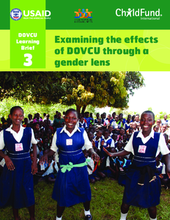“Deinstitutionalization of Orphans and Vulnerable Children Project in Uganda” (DOVCU) was a three-year project (2014-2017) that aimed to keep and reintegrate children into the care of families. ChildFund International led the consortium of project partners, including Transcultural Psychosocial Organization (TPO Uganda), Child’s i Foundation (CiF) and Retrak. Together, the DOVCU project partners delivered an integrated package of interventions with the aim of decreasing household vulnerabilities for: 1) households at risk of child separation, and 2) households with children reintegrating from CCIs. The project also aimed to strengthen the institutional capacities of government officials and other key stakeholders to operationalize the Alternative Care Framework and strive for family-based care for all children.
This learning brief analyzes quantitative data from both households at risk of separation and reintegrating households to understand how the DOVCU package of integrated social and economic interventions affects children and households differently depending on the sex of the child, caregiver, and/or household head.
This document is part of a series of three learning briefs. Each learning brief is designed so that it can be read independently, however, reviewing all three briefs enables the reader to obtain a more comprehensive view of the program’s effects.
Read the Final Report of the DOVCU Project here.

